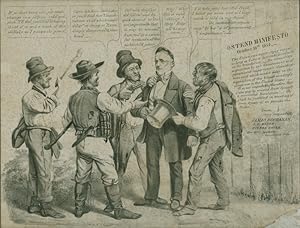[THE "OSTEND DOCTRINE." PRACTICAL DEMOCRATS CARRYING OUT THE PRINCIPLE]
[Cuba]: [Buchanan, James]
From
William Reese Company - Americana, New Haven, CT, U.S.A.
Seller rating 4 out of 5 stars
![]()
AbeBooks Seller since July 13, 2006
About this Item
Description:
Broadside, 10 x 13 inches. Foxed, bottom right corner chipped. Lower margin trimmed, costing the title. Good only. Framed under glass. A scarce political cartoon regarding the controversial Ostend Manifesto, the initially- secret attempt by the United States to purchase Spanish-controlled Cuba. Earlier, President Franklin Pierce had instructed Pierre Soulé, upon his appointment as minister to Spain in April 1853, to negotiate to buy Cuba. Three American foreign ministers serving in Europe - James Buchanan, John Y. Mason, and Soulé - met secretly at Ostend, Belgium in late 1854 to draft a plan to either buy Cuba from Spain or force Spain to give up Cuba by inciting a Cuban revolution. The plan met with overwhelming opposition once it was made public in America. In the present political cartoon Buchanan is attacked for his role in the Ostend controversy. He is surrounded by four armed ruffians seeking to rob him of his coat, hat, watch, and money, a particularly sharp turn- about on the American minister to Great Britain. The muggers' demands include quotations from the manifesto, which is pasted to the fence at right. Buchanan calls out: "Why! Why! This is rank robbery! Help! Help! All honest men!" The fallout from the Ostend controversy was widespread. President Pierce's Democratic Party split asunder after he refused to continue any discussions of the plan or any other expansionist ideas; Soulé understandably resigned; and the international community saw it as a threat to Spanish sovereignty in the region. Oddly enough, James Buchanan was not too hurt by the controversy; he was easily elected president in 1856, and still harbored hope for Cuban annexation. He was smart enough, however, to table the Cuba question for the foreseeable future after meeting with both popular opposition and increasingly bitter sectional conflict, the latter only spurred on by incidents such as the Ostend controversy. CURRIER & IVES: CATALOGUE RAISONNÉ 5021. NEVINS & WEITENKAMPF, p.72-73. Seller Inventory # WRCAM53452
Bibliographic Details
Title: [THE "OSTEND DOCTRINE." PRACTICAL DEMOCRATS ...
Publisher: Nathaniel Currier, [New York
Publication Date: 1856
Top Search Results from the AbeBooks Marketplace
[THE "OSTEND DOCTRINE." PRACTICAL DEMOCRATS CARRYING OUT THE PRINCIPLE].
Seller: William Reese Company - Americana, New Haven, CT, U.S.A.
Broadside, 10 x 13 inches. Foxed, bottom right corner chipped. Lower margin trimmed, costing the title. Good only. Framed under glass. A scarce political cartoon regarding the controversial Ostend Manifesto, the initially-secret attempt by the United States to purchase Spanish-controlled Cuba. Earlier, President Franklin Pierce had instructed Pierre Soulé, upon his appointment as minister to Spain in April 1853, to negotiate to buy Cuba. Three American foreign ministers serving in Europe - James Buchanan, John Y. Mason, and Soulé - met secretly at Ostend, Belgium in late 1854 to draft a plan to either buy Cuba from Spain or force Spain to give up Cuba by inciting a Cuban revolution. The plan met with overwhelming opposition once it was made public in America. In the present political cartoon Buchanan is attacked for his role in the Ostend controversy. He is surrounded by four armed ruffians seeking to rob him of his coat, hat, watch, and money, a particularly sharp turn-about on the American minister to Great Britain. The muggers' demands include quotations from the manifesto, which is pasted to the fence at right. Buchanan calls out: "Why! Why! This is rank robbery! Help! Help! All honest men!" The fallout from the Ostend controversy was widespread. President Pierce's Democratic Party split asunder after he refused to continue any discussions of the plan or any other expansionist ideas; Soulé understandably resigned; and the international community saw it as a threat to Spanish sovereignty in the region. Oddly enough, James Buchanan was not too hurt by the controversy; he was easily elected president in 1856, and still harbored hope for Cuban annexation. He was smart enough, however, to table the Cuba question for the foreseeable future after meeting with both popular opposition and increasingly bitter sectional conflict, the latter only spurred on by incidents such as the Ostend controversy. CURRIER & IVES: CATALOGUE RAISONNÉ 5021. NEVINS & WEITENKAMPF, p.72-73. Seller Inventory # 53452
Quantity: 1 available

